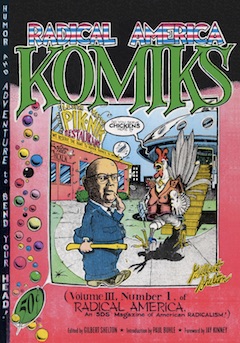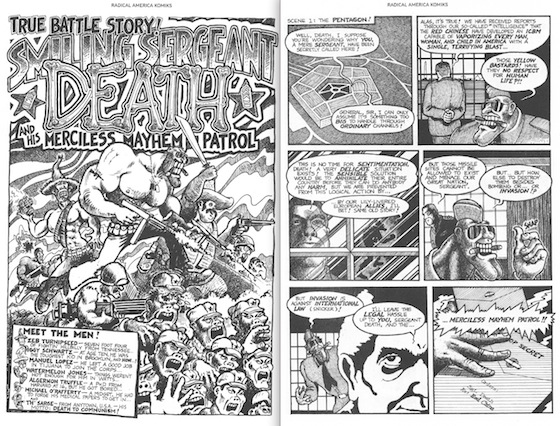“Buckle your seatbelt and fire up your time machine. You are about to blast yourself back nearly fifty years to a simpler time when America was at war, the country was polarized, a crazed and despised president of the United States was in charge, cops were considered racist pigs, cannabis was omnipresent, and young radicals feared that racism was imminent. Wait a second!” —Jay Kinney, in the foreword to Radical America Komiks
WELL, WAIT MORE THAN A SECOND . . .
Kinney points out that Paul Buhle and a few close SDS friends (Students for a Democratic Society) “founded the modest scholarly journal Radical America in 1967 as a project to encourage an awareness within SDS of American left history and dynamics. Buhle, a history grad student, had a grasp of the sweep of American radical politics from the early 1800s up through the 1960s era—something which most other SDS members lacked. But he also had a yearning to make the past relevant to the present.
“This attuned him to the importance of current pop culture as a potential locus for radical impulses. Thus, encountering a copy of Gilbert Shelton’s early underground comics Fed ‘n’ Heads in 1968 inspired Buhle to contact Shelton and propose a special issue of Radical America that would double as an underground comic.”
In an essay, by itself worth the price of the book, Buhle goes on to trace the “rebirth of rebellious comic art,” beginning with the fact that the special issue, which appeared in 1969,
was more historic than we young radicals could have guessed at the time. It marked the confluence of three large currents in contemporary society, each distinct if overlapping, a merging that lasted for an extended historical moment or two. The explosive counterculture, the widening antiwar sentiment, and the emergence of a new kind of comic art . . .
The strips contributed by Shelton, Jay Lynch, Skip Williamson, Rick Griffin, Tony Bell, Jack Jackson, S. Clay Wilson, Rory Hayes, and Victor Moscoso make that fully evident in the pages that follow Buhle’s essay. Here’s a sample.






